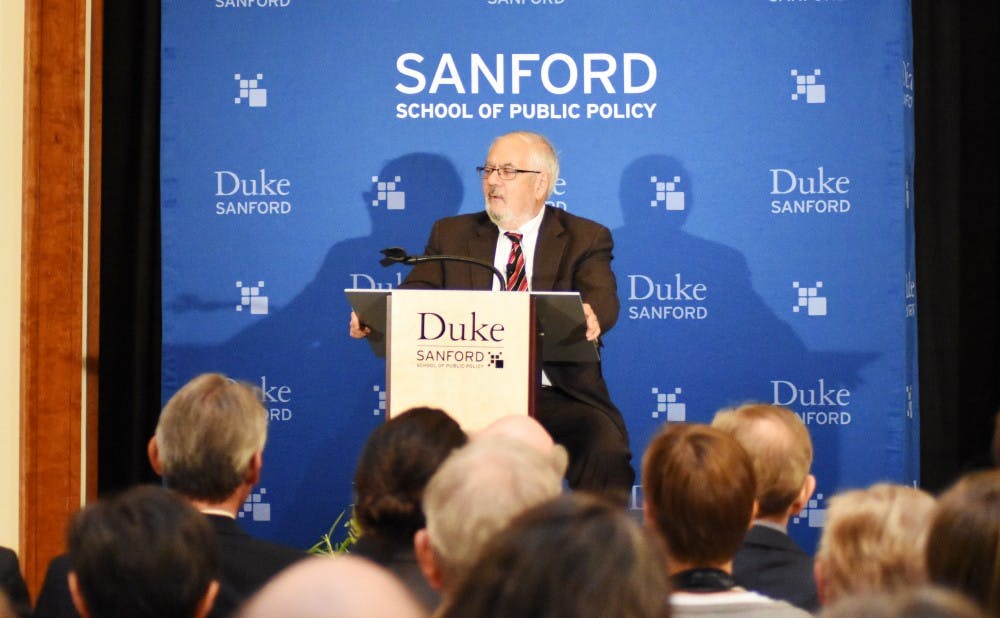A former U.S. congressman who is the namesake of the post-recession Dodd-Frank financial reform bill urged politicians and citizens to be more open to compromise in a talk at the Sanford School of Public Policy Tuesday.
Barney Frank—a Democrat who served in the House of Representatives for 32 years—said that pragmatism and agreement is critical in today's divisive political atmosphere. Frank will be on campus until Thursday. Dozens of faculty members and students attended his talk—"The Fight for a Fair Society: Is Pragmatism a Betrayal?"
“There has always been the argument that you should not compromise...because if you accept less than your full desire, you are never going to get better than that," Frank said. "[This is] just factually not true...I cannot think of any good social advance that wasn’t a compromise when it happened.”
Frank gave an example of a time when compromise would have been particularly beneficial. He said that Democrats should have compromised with President Richard Nixon in the 1970s when he proposed healthcare reforms. Frank added that Democrats simply rejected Nixon’s proposal because they did not agree with it completely. But if the party agreed with Nixon’s proposal, healthcare would be in a much better place today, he said.
The former congressman continued to explain that sometimes people are so idealistic that they are incapable of pragmatism, which keeps them from making compromises.
"Ideals without any pragmatism—without any concern about whether or not they’re implemented—is kind of a recipe for you to feel morally superior and not help anybody else," he said.
He added that even though he considers himself an idealist, he is always open to negotiating and making concessions. Frank said he believes that there is no point of having ideals if one does not learn to practically carry them out.
"No unrealized ideal ever fed a hungry child, provided medical care to somebody who needs it or prevented pollution or did anything good," Frank said. "The issue is when and how you get pragmatic."
Frank noted that pragmatism has recently suffered more than usual in the political sphere. He said that this is in part because people who are politically active live in “parallel universes.” Everything they read, hear and learn is different. Liberals watch MSNBC and read the Huffington Post, whereas conservatives watch Fox News and read Breitbart, Frank said.
He said the political divide has grown so stark that people are even making residential choices based on their ideals.
"People come to think that their views are the majority because everyone they know thinks that way," Frank said. "That poses a particular problem when they’re asked to accept a compromise."
Frank said that people living in political bubbles affects their expectations and opinions of political leaders. When politicians cannot achieve exactly what they hope for, they are viewed as betrayers rather than people who “correctly assessed the situation and couldn’t get more done.”
This tendency to underestimate the challenges of meeting goals extends to the federal level, he noted. On one occasion, when Frank and other Democrats were trying to get a healthcare bill passed and couldn't secure enough votes, liberal voters exclaimed: "What do you mean you don't have the votes for healthcare? Everyone’s for it!"
He added to the anecdote, saying "everyone they knew was for it."
“I want to say to people, these are [the] people who want to help you. Why do you want to make them lose?" he said.
In recent years, Frank said people have blamed him for only serving the gay community, and not the transgender community, because he is gay but not transgender. Frank usually counters the criticism by saying that he has consistently voted for anti-discriminatory laws that do not directly affect him, but rather are related to gender, race or disability, he said.
"There’s always this argument that you’re selling out [if you don't achieve everything immediately]," he said.
Frank gave another example idealism in politics by explaining that Tom Steyer—a progressive fundraiser—is so idealistic about his beliefs that he refuses to fund any Democrat who does not support Trump's impeachment. Frank said that Steyer knows Trump will not get impeached in the near future but that "he wants to feel good" about himself, so he sets the bar high.
"The problem now is the people who are making demands, don't want world results. They want psychic insight," Frank said. "The more of your time you spend reinforcing the views of those who agree with you and basking in their admiration, the less likely you’re going to be to help your cause."
Frank shared his frustration with voters who are angered by politicians who do not accomplish every thing that they promised.
Free speech on university campuses also came up in Frank's talk. He noted that though many students argue that they ought to be protected against topics that make them uncomfortable, some topics that are considered appropriate to talk about today may make others uncomfortable in the future.
“Be very careful of that [trigger warning] argument because it could come back and be used against you," Frank warned.
Frank will give another talk on financial regulations with Rubenstein Fellow Sarah Bloom Raskin, former deputy secretary of the Department of the Treasury, Wednesday at 12:30 p.m. in the Law School.
Get The Chronicle straight to your inbox
Signup for our weekly newsletter. Cancel at any time.

